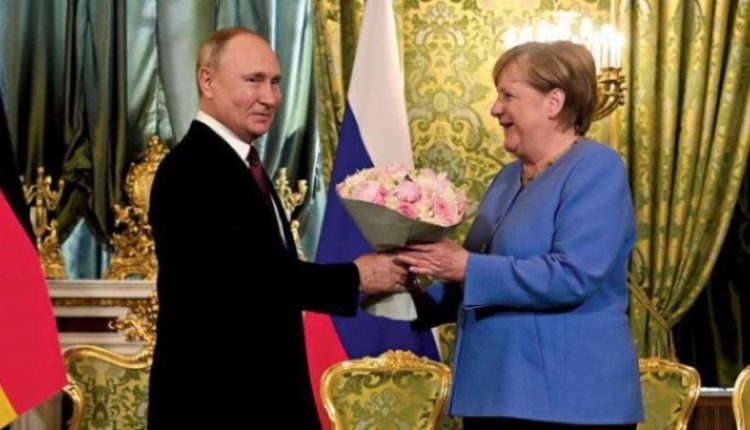THE RUSSIAN MILITARY OPERATION IN UKRAINE AND THE DECEPTION OF THE MINSK CONFERENCE

By General Monzer El Ayoubi*
Translation: Dr Pierre A. Sarkis

Regardless of their political systems, historical and emerging ideological sources, and their current and future interests, The European Union Countries hardly get out of one predicament until they get involved or fall into another. From the point of view of observers and researchers, despite the diversity of their approaches and premises, relying on the proof of research neutrality, its approach to treatments in order to seek solutions that have always come as interim, produces decisions and recommendations that are not consistent with reality, or at least do not anticipate, as much as, the geopolitical results, as well as, the repercussions on the old continent.
Thus, the possibility of theoretically going back to time according to the equation of the astrophysicist Ronald Mallett to correct virtual reality is still physically impossible, which means that it is impossible for The Time Machine to succeed in changing or modifying the course of the present to ensure the avoidance of events and disasters. Therefore, it is possible to read the past, only to deduce a modification in goals and strategies, so that the machine of war and destruction stops:
1- On 5 September 2014, after consultations and diplomatic efforts involving the Trilateral Contact Group “Russia, Ukraine, as well as, French President Francois Hollande and German Chancellor Angela Merkel, and the Organization for Security and Cooperation in Europe (OSCE), representatives of the troika and leaders of the Donetsk People’s Republic (DPR) and Lugansk People’s Republic (LPR) signed, “without recognizing their political status” the Minsk Protocol in Minsk, the capital of Belarus which stipulated the cessation of hostilities and the end of the state of war in the Donbas Region.
2- After repeated criticism of his European allies, US President Donald Trump arrived in Brussels on June 11, 2018 to participate in the NATO summit, where he declared that many countries in the alliance “do not fulfill their commitments” in terms of defense spending, which confused and raised the level of doubts among European officials about the intentions of the master of the White House, who often made hostile statements towards them.
3- In the same period in 2018, French President Emmanuel Macron and German Chancellor Merkel expressed their support for the idea of establishing a unified European army, in parallel with President Trump’s decision to withdraw his country from the Intermediate-Range Nuclear Forces Treaty concluded on December 8, 1987 with the Union of Soviet Socialist Republics, accusing Russia of violating its provisions. The latter responded at the time by announcing the suspension of its obligations under the agreement.
4- At the first summit meeting between President Trump and his Russian counterpart Vladimir Putin in the Finnish capital Helsinki on July 16, 2018, Trump praised the meeting with Putin, considering the talks “as only the beginning, confirming its success with their agreement to continue the dialogue.” Remarkably, after the bilateral summit meeting, President Trump vowed not to allow the European Union to “exploit” the United States, arguing that European countries benefit “unfairly” from NATO protection, as well as, trade with Americans.
The White House leader saw proposals for a unified European army as an “insult” to the United States and NATO. Consequently, most of the alliance’s military leaders have committed to the American approach to work to discourage independent European defense capabilities, avoid duplications and thwart the ability to unilaterally make independent strategic decision. In the same context, NATO Secretary General Jens Stoltenberg considered that the “European Union is unable to defend itself without NATO, and it should not try to form a common European army.”
Later, and in a short period of time, the military operation on Ukraine came to confirm European shortcomings in the face of Russia, an incentive to establish an inevitable position under the protectionism of the NATO umbrella; and in the face of security confusion in absorbing refugees, economic deterioration and shrinking energy resources, calls and movements escalated from several social and political segments, especially in Germany and France, demanding withdrawal from the alliance based in Brussels, the Belgian capital, but its reference and leadership are in the American Pentagon, even indirectly. Recently, in an interview with “Zeit” Angela Merkel revealed that “the Minsk Agreement of 2014 was an attempt to give Ukraine enough time to arm itself and prepare for war against Russia” expressing her doubt that the NATO countries could have done everything they are doing now to help Ukraine.
The Kremlin seized the acknowledgment of the “deception” as a basis for Merkel’s statement to express its displeasure. President Putin told reporters in Kyrgyzstan’s capital, Bishkek, “I always assumed that the leadership of the Federal Republic of Germany would behave honestly with us; honestly, this was not expected. Its frustrating. I honestly did not expect to hear anything like this from the former German Chancellor.” Former Ukrainian President Petro Poroshenko commented that “they never intended to implement the Minsk Agreement, and this makes the status quo a completely new landscape.” Justifying the Russian military operation, he added, “it doesn’t really change who attacked whom, but it does change the attitude to what has been happening in Ukraine since 2014.”
In a related context, it is clear that Angela Merkel’s statement of deliberate delay and a veiled decision to procrastinate the implementation of the Minsk Agreement with the aim of preparing Ukraine for the moment of military confrontation with Russia, undermines the credibility of the Western signatories and confirms the geopolitical collusion of Britain, the United States and Ukraine to push Moscow into the arena of destructive conflict. In terms of gains, the United States considers European territory to be its first line of defense. The war waged by Russia reveals the elements of its military capabilities and the success and effectiveness of its advanced weapons; its drowning in the Ukrainian quagmire will exhaust it militarily, contribute to the decline of its economy and limit its geostrategic ambitions.
In the strategic stubbornness, the reasonableness possessed by Russian President Vladimir Putin has increased, as it represents a sharp break from the Soviet past and a strong link with Tsarist Russia; and he also considers that his country is facing an unprecedented challenge from the European and American West since the recapture of the Crimea in 2014. In this context, and with this motivated insistence that Germany acknowledged the deception of the Minsk Conference, he recorded during the week the following: he visited the headquarters of the participating forces to be briefed on the developments in the field, as well as, to listen to the proposals of commanders working in all operational directions; an expanded meeting with senior military leaders to assess the performance of the Russian Army during the previous year and determine its tasks for the coming year. His decision was to continue the military operation in Ukraine to protect the population of the Donbas Region, and to complete the liberation of the new Russian territories in the Republics of Donetsk and Lugansk, and the Zaporizhzhia and Kherson Regions from the forces of Kyiv and their allies of Western and Polish mercenaries, according to a Kremlin statement.
Finally, the Spring of next year will come after a harsh European Winter to return things to their beginnings, where the revival of the Minsk Agreement will be the cornerstone in the formulation of any future solutions, its non-negotiable constants being: Ukraine is a special and absolute zone of influence outside NATO, with international legitimacy bestowed on the areas that were carved out of Ukraine and joined the Russian Federation.
Beirut, 20/12/2022
Scholar in Security and Strategic Affairs

